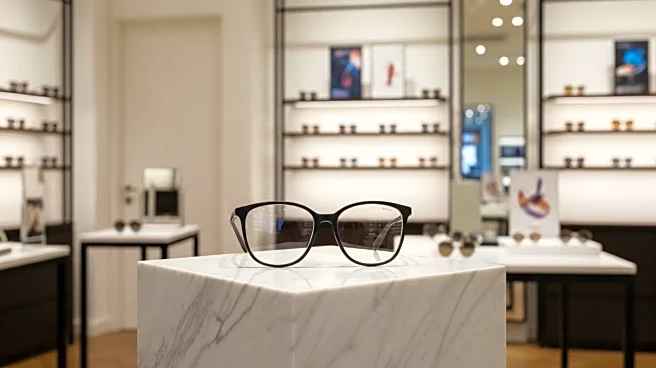What is the story about?
What's Happening?
Warby Parker, a company known for its innovative approach to eyewear retail, is shifting its strategy by expanding its physical store presence while phasing out its home try-on program. Co-founders Neil Blumenthal and Dave Gilboa initially launched the brand as a digitally native company, offering a home try-on service that allowed customers to test frames at home before purchasing. However, with advancements in technology and the opening of over 300 stores nationwide, the company has decided to end this program by the end of the year. Warby Parker plans to open 45 new stores this year, following a steady expansion strategy of approximately 40 stores annually since 2022. The company is also enhancing its virtual try-on technology, allowing customers to visualize frames on their faces using augmented reality tools.
Why It's Important?
The decision to expand physical stores and end the home try-on program marks a significant shift in Warby Parker's business model, reflecting broader trends in retail where companies balance online and offline presence. This move could impact the eyewear industry by setting a precedent for integrating advanced technology with traditional retail. The expansion of physical stores may increase accessibility for customers, potentially boosting sales and brand visibility. The shift also highlights the growing importance of augmented reality in retail, as consumers increasingly rely on virtual tools for shopping experiences. Warby Parker's strategy may influence other direct-to-consumer brands to reconsider their reliance on online-only models.
What's Next?
Warby Parker's expansion strategy suggests a continued focus on increasing its physical footprint, with the potential to reach 900 stores in the future. The company is also enhancing its virtual shopping experience through tools like the Advisor feature, which uses AI to recommend frames based on facial features and style preferences. Additionally, Warby Parker's partnership with Target, involving shop-in-shops offering eyewear and eye exams, could further extend its reach and customer base. As the company navigates this transition, it will likely continue to innovate in both its physical and digital offerings to meet evolving consumer needs.
Beyond the Headlines
The shift away from the home try-on program may have implications for consumer behavior and expectations in the eyewear market. As Warby Parker integrates more technology into its shopping experience, it raises questions about privacy and data usage, particularly with AI-driven tools. The company's partnership with Target also reflects a trend of strategic collaborations in retail, which can enhance brand visibility and customer convenience. This development may influence other retailers to explore similar partnerships to expand their market presence.


















